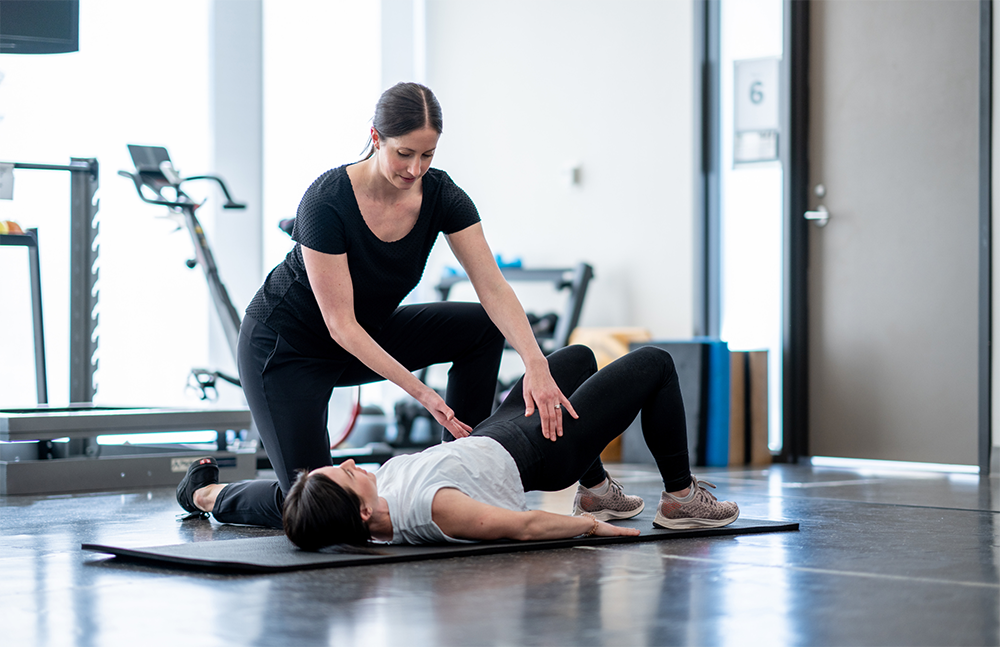When I had my little girl just over 5 years ago, it was the most precious moment of my life. This little thing that was connected to me, part of me, for so long now took up her own space in the world. In the beginning, despite the pain, discomfort, and lack of sleep, I was so happy to be her mother. Fast forward 6 weeks>>> My postpartum check-up was the complete opposite of bliss. It was short, impersonal, and all-but useless. This period after giving birth, whether as a first-time mom or not, is an incredibly emotional delicate time. And even as a professional fitness coach, my knowledge of the rehabilitation process of my pelvic floor, my whole body really, was limited at best and insufficient for what I had gone through.
I asked myself, “Is this the industry standard? Am I alone in experiencing this lack of postpartum and post-trauma care?!”
I needed someone smarter than me to tell me I’m okay (or not). I still had a pulling feeling at the location of my stitches, and the visual exam at that 6-week check-up left me feeling more alone on this journey than when I walked in. I only progressed in the healing process after traveling across town to a private clinic where a complete internal exam was performed, and I finally felt heard. However it was at a cost so high that I couldn’t justify going back a second time.
Anatomy lesson time! So what is the pelvic floor, why is it so important to take care of?
Before we go any further I want to say that the taboo around the issues involving the pelvic floor are so unjustified. Urinary incontinence is a medical issue, the same as juvenile diabetes. It needs to be dealt with and cared for in the correct way, with caring, healing treatment. Not left brushed under the rug. Or worse-with a suggestion to “just do some kegels!” from your trusted yet out-of-touch provider.
“The pelvic floor is a diamond-shaped group of muscles that sits in the bowl of the pelvis–it runs from sit bone to sit bone and from pubic bone to tailbone” says Dr. Helene Darmanin, pelvic health physical therapist, Strong as a Mother coach, and founder of Mama Bear PT. The most superficial layer of the pelvic floor muscles meet at the perineum. Which is often the location of possible tears and where an episiotomy might take place. The deep muscles found in this area are the magic that holds everything in place. Why should we take care of these muscles:
- They hold EVERYTHING in place- rectum, urethra, bladder, and uterus
- They help maintain continence-when stressed and/or weak it becomes difficult to hold urine in
- The stronger and more supple they are the more readily and intensely you orgasm!- now you sit up and listen!
- They are part of your core: “If you think of your core as a box, the pelvic floor makes up the bottom–and a box isn’t terribly effective without the bottom” says Darmanin.
The pelvic floor also mirrors the diaphragm. It moves down when we inhale. Try taking a deep breath now and testing it out! So now we get to the shocker: Kegels are the OVERPRESCRIBED solution.
Yes your OB/GYN told you to perform Kegels, your sister, your best friend who had 3 kids, your GP…
So, why not Kegel (as much as you thought you should)?
Firstly, a kegel is an exercise that tightens up the muscles down there. It pulls everything together and brings the perineum up towards the ribs.
But as with any muscle, to train it properly we also need to be able to relax it completely. When we do Kegels we are often just tightening the muscle. If it holds too much tension it becomes hard to relax which is more damaging than beneficial!
So, how do we relax the muscles to work on building strength? Deep-breathing. You heard it right; deep breathing as we know is often a technique used to relax. Well, here we will be performing deep breathing to concentrate on the natural movement of the pelvic floor muscles.
Tense? weak?- how to tell?
As a professional, it’s easier for a physical therapist like Dr. Helene to be aware of if you are weak, tense or otherwise in your pelvic floor. But how can we learn to understand our own bodies? There are a few signs to determine if you are tense:
- pain from the beginning of intercourse
- not feeling like you’ve emptied your bladder after using the bathroom
- difficulty taking a deep breath
- constipation
- pelvic pain- such as I had, the pulling pain on one side after giving birth
The most common sign of a weak pelvic floor is leaking urine: When you cough, sneeze, do jumping jacks or squats, or just stand up. It is not something which you should live with or adjust to, rather something that should be treated as a way to help you feel healed and whole again after the major trauma that is childbirth. We need more open conversations about this so the aftercare, post-partum, can improve for all.
Finally the big question, how long should it take to feel improvements?
The textbook answer would be 6-8 weeks, because of the tissue change that takes place in that time. But before 6 weeks it is just the neuron pathways that will be affected. Just your brain recognizing the change. Real muscle change takes longer. But from 2-3 weeks in you should see an upward trend in results. And almost immediately the deep breathing should leave you more aware of your body.
Dr. Helene is one of the coaches that make up the Strong as a Mother coaching team. We empower women to live a sustainably healthy life by creating customized and comprehensive fitness, nutrition, and postpartum care programs. Not only do we provide online care- making it easier to seek out the care you need after giving birth without having to travel across town(s) to receive it, but we also have a community of like-minded mamas on similar journeys as you so you don’t ever have to feel alone in this ever again.
Pelvic floor health is just one aspect of our health that is vital. I believe women deserve better for themselves. You shouldn’t have to choose between being fit or being a mom. Stop treading water. Start living a more energy fulfilled day. Reclaim your health, and you life, now. Click here to find out if my Strong as a Mother coaching program is just the thing you’ve been looking for. My team and I will have you get strong in all the ways that matter- physically, mentally, and emotionally…WITHOUT a ton of cardio nor restrictive dieting. Giving you the energy you need to feel good about yourself, great as a mom and strong as a woman.
Want to join our village? Click the image below to catch more on-point, no-nonsense support, fitness, wellness and nutrition tips here for free: www.facebook.com/groups/saamnyc


